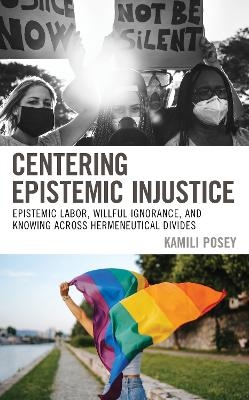
Centering Epistemic Injustice
Epistemic Labor, Willful Ignorance, and Knowing Across Hermeneutical Divides
Seiten
2023
Lexington Books (Verlag)
978-1-4985-7259-0 (ISBN)
Lexington Books (Verlag)
978-1-4985-7259-0 (ISBN)
Centering Epistemic Injustice asks what it means for accounts of epistemic injustice to take seriously the lives and perspectives of socially marginalized knowers and the strategies that marginalized knowers use to circumvent persistent testimonial injustice.
In Centering Epistemic Injustice: Epistemic Labor, Willful Ignorance, and Knowing Across Hermeneutical Divides, Kamili Posey asks what it means for accounts of epistemic injustice to take seriously the lives and perspectives of socially marginalized knowers. The first part of this book takes up the predominant account of testimonial injustice offered by Miranda Fricker, arguing that testimonial injustice is not merely about the epistemic harms perpetrated by dominant knowers against marginalized knowers, but also about the strategies that marginalized knowers use to circumvent those harms. Such strategies expand current conceptions of epistemic injustice by centering how marginalized knowers engage and resist in hostile epistemic environments. The second part of the book examines Fricker’s concept of hermeneutical injustice, rooted in hermeneutical marginalization. Thinking alongside critics of hermeneutical injustice, Centering Epistemic Injustice explores the relationship between dominant knowing and marginalized knowing and asks if social power—including the power to shape collective resources and ways of meaning-making—makes it impossible for dominant knowers to know and “hear well” across hermeneutical divides. Finally, the book asks whether hermeneutical divides are real divides in understanding and how dominant knowers might come to be better knowers in the pursuit of a more thoroughgoing epistemic justice.
In Centering Epistemic Injustice: Epistemic Labor, Willful Ignorance, and Knowing Across Hermeneutical Divides, Kamili Posey asks what it means for accounts of epistemic injustice to take seriously the lives and perspectives of socially marginalized knowers. The first part of this book takes up the predominant account of testimonial injustice offered by Miranda Fricker, arguing that testimonial injustice is not merely about the epistemic harms perpetrated by dominant knowers against marginalized knowers, but also about the strategies that marginalized knowers use to circumvent those harms. Such strategies expand current conceptions of epistemic injustice by centering how marginalized knowers engage and resist in hostile epistemic environments. The second part of the book examines Fricker’s concept of hermeneutical injustice, rooted in hermeneutical marginalization. Thinking alongside critics of hermeneutical injustice, Centering Epistemic Injustice explores the relationship between dominant knowing and marginalized knowing and asks if social power—including the power to shape collective resources and ways of meaning-making—makes it impossible for dominant knowers to know and “hear well” across hermeneutical divides. Finally, the book asks whether hermeneutical divides are real divides in understanding and how dominant knowers might come to be better knowers in the pursuit of a more thoroughgoing epistemic justice.
Kamili Posey is assistant professor of philosophy at the City University of New York, Kingsborough.
Introduction
Chapter 1: Testimonial Virtue and Testimonial Justice
Chapter 2: Epistemic Labor, Epistemic Dissonance, and Epistemic Disavowal
Chapter 3: Hermeneutical Marginalization and Willful Hermeneutical Ignorance
Chapter 4: Disagreement, Implicit Bias Interventions, and Evolving Epistemic Frameworks
Chapter 5: Epistemic Charity, Epistemic Standpoints, and Structural Epistemic Justice
References
Index
About the Author
| Erscheinungsdatum | 10.01.2023 |
|---|---|
| Verlagsort | Lanham, MD |
| Sprache | englisch |
| Maße | 151 x 228 mm |
| Gewicht | 245 g |
| Themenwelt | Geisteswissenschaften ► Philosophie ► Erkenntnistheorie / Wissenschaftstheorie |
| Sozialwissenschaften ► Politik / Verwaltung | |
| Sozialwissenschaften ► Soziologie | |
| ISBN-10 | 1-4985-7259-6 / 1498572596 |
| ISBN-13 | 978-1-4985-7259-0 / 9781498572590 |
| Zustand | Neuware |
| Haben Sie eine Frage zum Produkt? |
Mehr entdecken
aus dem Bereich
aus dem Bereich
die Grundlegung der modernen Philosophie
Buch | Softcover (2023)
C.H.Beck (Verlag)
18,00 €
Buch | Softcover (2023)
Reclam, Philipp (Verlag)
7,00 €

![Was heißt Denken?. Vorlesung Wintersemester 1951/52. [Was bedeutet das alles?] - Martin Heidegger](/media/113619842)
